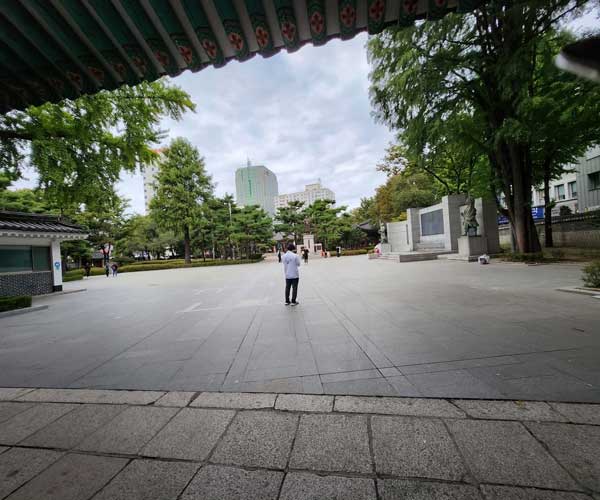Squid Game 2 portrays Tapgol Park as a “Homeless Shelter”

[A photo of Tapgol Park. Photo Credit: Jihoon Suh]
Netflix’s global hit series Squid Game has exported the themes of poverty and modern capitalism which captivated audiences worldwide with its gripping portrayal of South Korean society.
The highly anticipated Squid Game Season 2, which was released on Netflix in December 2024, continues its commentary on social issues while also promoting traditional Korean games and culture to a global audience.
However, controversy erupted over Episode 1: Bread and Lottery, where Tapgol Park is portrayed merely as a homeless shelter, with its inhabitants referred to as “pieces of trash” by characters in the series.
Critics argue that this language and depiction raise serious concerns about how media representations shape public perceptions of marginalized communities and historical landmarks.
The show overlooks Tapgol Park’s immense historical significance as the site of Korea’s largest national resistance movement against Japanese colonial rule.
On March 1, 1919, the Declaration of Korean Independence was proclaimed in the pavilion at Tapgol Park for the first time, launching the March 1st Independence Movement and igniting a nationwide struggle for national sovereignty.
The historic site is also home to several national treasures, including the ten-story Wongaksa pagoda, which experts consider one of the finest examples of Joseon Dynasty stone craftsmanship, notable for its sophisticated marble construction.
According to local historians, the presence of homeless people in Tapgol Park dates back to the late 20th century, primarily due to the International Monetary Fund (IMF) crisis in Korea.
The economic downturn forced many to seek refuge in the park, which became an unofficial shelter.
Since 2019, however, youth national heritage guardians, including local and international volunteers, have been working to improve conditions.
The group provides free meals and maintains a clean environment for the homeless, while also promoting the park’s importance on social media.
Their efforts have yielded results, with various national events now being held in the park and increasing numbers of local and foreign tourists visiting the site.
Nevertheless, the portrayal of Tapgol park in Squid Game 2 is denigrating the national heritage of Korea by perpetuating an outdated and stigmatizing misconception to both Korean and international viewers.
While the series aims to highlight societal struggles and moral dilemmas under capitalism, yet its depiction of the homeless community in such a demeaning manner overshadows these central themes.
The show has successfully introduced Korean traditional elements to its global audience, such as Dalgona, Mugunghwa flowers, and traditional Korean food and games.
However, activists and historians contend that its representation of Tapgol Park fails to acknowledge the site’s profound historical legacy.
Although Squid Game 2 effectively sheds light on the harsh realities of economic disparity, the show’s use of derogatory terms and limited portrayal of this historic site may do more harm than good in fostering genuine social awareness.

- Jihoon Suh / Grade 11
- Chadwick International School

![THE HERALD STUDENT REPORTERS [US]](/assets/images/logo_student_us.png)
![THE HERALD STUDENT REPORTERS [Canada]](/assets/images/logo_student_ca.png)
